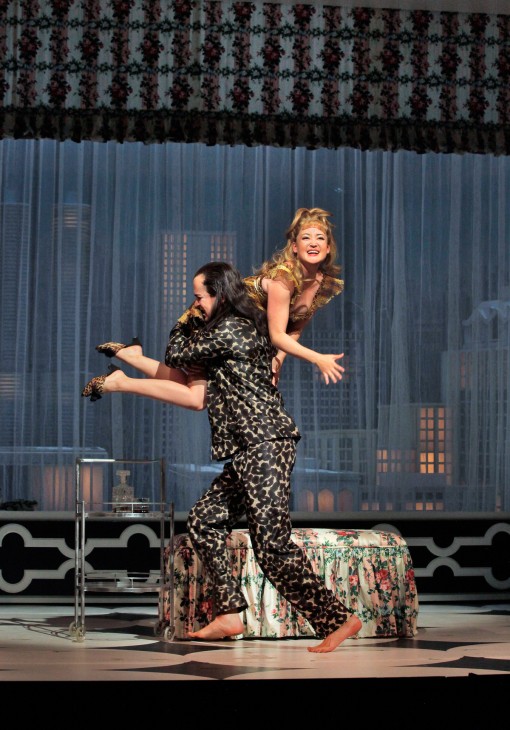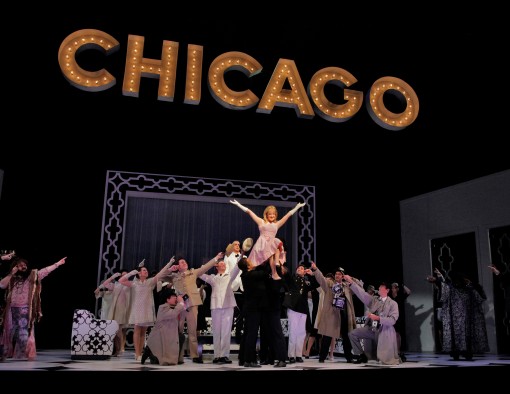Santa Fe Opera’s revival of Menotti comedy is savagely delightful

Anna Christy as Kitty and Daniel Okulitch as Abdul in Santa Fe Opera's production of Gian Carlo Menotti's "The Last Savage." Photo: Ken Howard
Gian Carlo Menotti’s The Last Savage was a victim of bad timing and European musical snobbery. Following critical drubbings at its Italian and French premieres, Menotti’s satiric comic opera opened at the Met in 1964 — three months after the assassination of President Kennedy. With political change in the air and the Vietnam War accelerating, audiences were not in the mood for a comedy that poked fun at religion, American materialism and cultural ethnocentrism. The Last Savage never quite recovered from its unsuccessful American premiere — even with a cast conducted by Thomas Schippers that boasted George London, Roberta Peters, and Teresa Stratas — and Savage remains one of Menotti’s least-revived works.
Forty-seven years after its Met debut and away from the prevailing political winds, it’s possible to take The Last Savage, presented Friday night at Santa Fe Opera, on its own terms. And while Menotti’s 20th-century “grand opera buffa” is undeniably a lightweight piece — closer to operetta in style — the music is consistently attractive and consummately well crafted with several lyric arias, a terrific septet and a party scene that shows Menotti’s contrapuntal mastery at its most bravura. Further, the opera’s political and cultural barbs feel even more dead-on today that they must have seemed in 1964.
Young American anthropologist and recent Vassar graduate Kitty Scattergood comes to India to search for the world’s “last savage” — the topic of her thesis — but her millionaire father would rather see Kitty marry the wealthy Maharajah’s son. Her father plots with the Maharajah to produce a “savage” for Kitty; they hire the poor peasant Abdul to play one, and Abdul reluctantly assumes the role, allowing himself to be captured for $100,000.
Back home in Chicago Kitty gradually becomes attracted to Abdul as she teaches him how to become “civilized.” At a cocktail party with several pretentious religious, political and cultural figures surrounding him, Abdul erupts and flees. He returns to the jungle where Kitty finds him and decides to move into the cave with him — as long as her father supplies several modern appliances for their convenience.
Both European and American critics were withering about Menotti’s libretto, but his lampooning of the dangers of forcibly imposing one’s own culture on others seems even more relevant today. Further, his most stinging barbs are reserved for the media, Darmstadt composers, Beat poets and abstract artists in a brilliant piece of satirical skewering worthy of Swift, which remains just as trenchant to the various petty little orthodoxies of our day.
But overall, Menotti’s satire is gentle and his view of the main characters remains affectionate even with the ditzy Kitty. In addition to a refreshing political incorrectness, there is a surprising romantic sweetness in Savage that takes the edge off the biting satire and makes us fond of all of the characters (tellingly, the Indian lovers have the most sincere and lyrical music).
All credit to the creative team of designer Allen Moyer and director Ned Canty who serve up enough clever visual and staging gems to keep even a cynical band of music critics laughing throughout the evening. The Santa Fe audience loved the booty-shaking Hindu chorus, and the period mid-1960s costuming and staging of the complex party scene was especially inspired, particularly the final tableau of the angry Abdul escaping out the window of Kitty’s high-rise apartment and, King Kong-like, climbing a Chicago skyscraper.
Anna Christy proved ideal as Kitty, her high soprano easily able to vault through Menotti’s stratospheric mock-coloratura writing. The vestpocket singer reminds one of Kristin Chenoweth in her petite stature and versatility, and Christy showed a similar ability to handle the broad farce as well as the vocal demands of the score.
With his buff physique and robust baritone, Daniel Okulitch proved ideal casting as Abdul, the faux savage. The Canadian singer brought a plaintive quality to his solo aria and blended nicely with Christy in their soaring Act 3 duet. Okulitch also showed a deft comic touch in his “savage” noises and Abdul’s bewilderment at the strange personages of Chicago high society.
Sean Panikkar and Jennifer Zetlan were both vocally assured and endearing as the young Indian couple, Kodanda and Sardula, with Zetlan delivering an affecting performance of her Act 3 aria. Kevin Burdette was amusing if a bit fey and over the top as Kitty’s capitalist father, Mr. Scattergood. Thomas Hammons as the Maharajah and Jamie Barton as his physically substantial stockmarket-whiz wife blended the comedy and singing with fine assurance.
Menotti offers deft individual comic turns for the large ensemble cast in the Act 2 party scene. With the aid of some dead-on costuming by Moyer, Santa Fe’s Apprentice Artists made the tricky scene come off with superb comic timing.
Conductor George Manahan — always an inspired advocate for neglected scores and American music — winningly brought out the brash vitality, lyricism and wry wit of Menotti’s colorful score. Manahan was recently cut loose from the financially troubled New York City Opera after thirteen distinguished seasons as music director. Here’s hoping that some smart, enterprising opera company will snap him up soon and provide a regular platform for his considerable gifts.
This is a virtually faultless production that should travel well and could restore The Last Savage to a more prominent place in the repertoire. Based on Santa Fe’s delightful revival Menotti’s engaging comedy deserves no less.
The Last Savage will be repeated August 11, 18 and 25. santafeopera.org; 800-280-4654.
